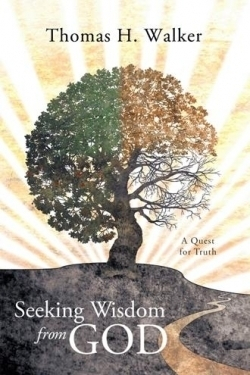Seeking Wisdom from God
A Quest for Truth
Seeking Wisdom from God: A Quest for Truth is both a traditionally Christian and surprisingly revolutionary book. From the outset, Thomas H. Walker reminds us that “Jesus did not come to earth to set up another religious denomination, but to put an end to religion.”
Using the premise that God’s message is like a jigsaw puzzle, Walker reassures the reader that eventually all pieces will fit to form the beautiful portrait of God’s love. He proceeds, then, in a logical fashion to take the reader through a series of scriptural concepts that build a convincing argument.
Christ’s washing of his disciples’ feet is the first and founding metaphor for his premise: the mustard seed that grows into full-blown philosophy. Christ washed the feet of his disciples and asked that they also wash each other’s feet. Walker interprets this scripture to mean that our feet are dirtied by walking through this sinful world. We must wash them daily (confess) and wash each other’s (forgive each other and ourselves). We will sin and sin again. Sin serves a purpose and we should not be defeated by it. It exists so that we may confess and seek forgiveness from God. This daily washing ensures that we stay in intimate contact with Christ. It supports a personal relationship which is not distorted by religious doctrine.
Well-considered references to familiar scripture support the author’s message through a series of chapters that explore common biblical references. The rapture, the expulsion from the garden of Eden, and the wedding feast are used to strengthen the argument that sin is caused by will and we overcome this weakness by learning from our personal experience and our personal relationship with God.
Thomas also takes his religion to task. “In the name of Christianity, there have been more wars fought, brutalities inflicted and … inhumane treatment of innocent people perpetuated.” He goes on to assure that Christianity is not the problem: It is ritual that obscures the truth that it was meant to reveal.
The author’s central message is compelling. There are echoes of Ralph Waldo Emerson, and Martin Luther King in his arguments for inclusiveness and compassion. The final chapters of the book might have been stronger if he had substituted a summary of his philosophy for conjecture about the Jew’s role in the Holocaust and God’s involvement with life on other planets. Taken out of context, these passages might alienate some readers and distract from his ecumenical message.
This book is nicely packaged, but merchandising standards should have been applied to the cover, which has too much text. Personal anecdotes effectively illustrate Walker’s points and copious references to scripture support his arguments. The charm of the author’s style is evident in observations like this: “…to see the Bible not as a history book, but a personal preview of coming attractions.” “God will see to it that you face Goliath, … and even a Pontius Pilate who will order your crucifixion for someone else’s mistakes”
Reviewed by
Marilyn Berry
Disclosure: This article is not an endorsement, but a review. The publisher of this book provided free copies of the book and paid a small fee to have their book reviewed by a professional reviewer. Foreword Reviews and Clarion Reviews make no guarantee that the publisher will receive a positive review. Foreword Magazine, Inc. is disclosing this in accordance with the Federal Trade Commission’s 16 CFR, Part 255.

